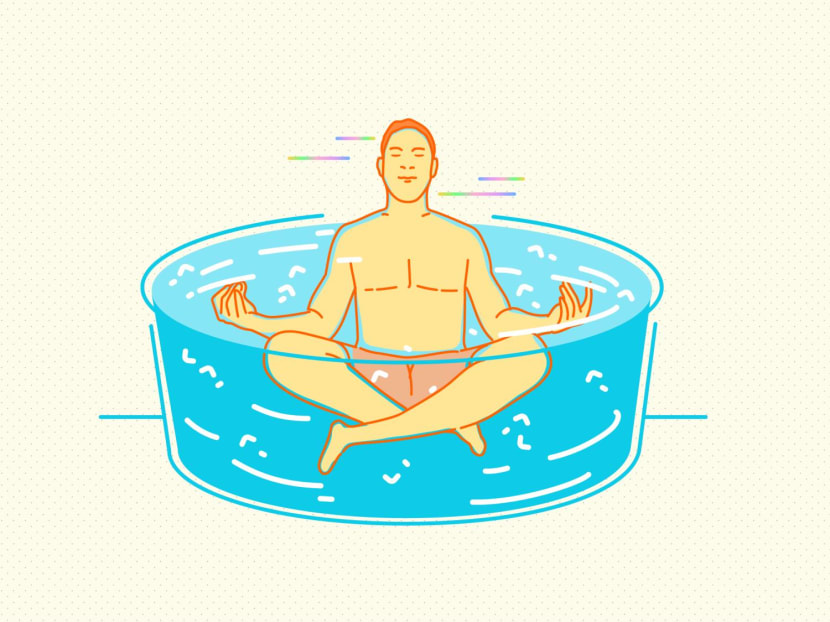Gen Zen: The ice bath cometh — can a dip in freezing water help with your mental health?

SINGAPORE — The icy water pricked at my skin first then pierced it, my calves and buttocks instantaneously on the verge of cramp. I was barely five seconds into my virgin cold plunge but already my body wanted out.
I know that athletes use ice baths to speed up their recovery, but I had never heard of freezing cold water’s supposed benefits for mental health.
Yet, this is what they say ice baths can do, and this chilly activity is gaining traction among Singaporeans, too.
Both Trapeze Rec Club and Soma Haus, wellness centres that provide the service, said that time slots for their ice baths tend to be booked up to two weeks in advance on weekends and on specific times on weekdays.
In addition to reducing stress levels, exposure to cold water for just several minutes at a time is also thought to:
- enhance alertness and mental clarity
- strengthen resilience
- increase energy levels
- improve one’s overall mood
- help with depression and anxiety
Having been trained to question the veracity of all things that sound too good to be true, I found myself one morning submerged from the neck down in a cylindrical tub packed with ice cubes — all in the name of science.
WILL A DIP IN ICE MAKE YOUR SPIRITS RISE?
I decided to assess the cold plunge experience and what it purported to help with mental well-being.
First, does it help with stress, increase energy levels and improve one's overall mood?
It certainly felt like that. After two-and-a-half minutes in 3°C waters, I shot up gingerly from the tub and did 20 jumping jacks to raise up my body temperature.
At once I was refreshed, my eyes wide open despite having slept only four hours the night before. Others reported feeling the same way.
Mr Kelvin Teo, chief operating officer of Grow Public Relations, said that he “immediately felt a sense akin to a runner’s high” after coming out of an ice bath for the first time.
“It is refreshing, and I also find that I am able to sustain better through my workouts the day after I do my ice baths,” the 32-year-old added.
Mr Teo said that he decided to try cold plunges last month because he exercised often and heard of its effectiveness in promoting muscle recovery.
He has done cold plunges every week since then.
Similarly, I felt like I was ready to tackle all the work tasks that awaited me that day and found myself uncannily productive.
Mr John Pinto, head of counselling at digital mental health firm ThoughtFull, said that this may be due to the effects of the cold shock.
For instance, immersing yourself in icy water triggers the release of stress hormones such as noradrenaline, which helps to alleviate pain, and cortisol, which regulates the body’s stress response.
The drop in temperature also increases brain chemicals that regulate mood such as dopamine, and activates the “parasympathetic branch” of the nervous system, which prompts the body to relax after a stressful event.
Mood-wise, the benefits of cold plunging seem to hold water.
BUILDING RESILIENCE
Intuitively, the cold plunge argument for building resilience is sound, considering the old “hard times create strong men” adage.
Having held on for 149 miserable seconds more than I thought I could have, my confidence in my ability to withstand pain and discomfort subtly but surely rose.
As it turned out, I was not alone in feeling this either.
Ms Jamie Eng, 38, is the chief-of-staff at the Trapeze Rec Club in Tanjong Pagar where I had my cold plunge experience.
She has taken weekly cold plunges for about two years and said: “Being in that cold plunge is not easy.”
Being able to overcome something really difficult gives her the “clarity to focus” on what she needs to do, as opposed to focusing on unideal situations themselves, she added.
She also said that the amateur and professional athletes who use the cold plunge facility at the wellness club do so not just for recovery, but also to build that “strong mindset” that is important in sport.
Science seems to support this argument as well.
Mr Sam Roberts, the founder and director of Olive Branch Counselling, Psychology and Therapy Clinic, said that the physiological adaptations that come with cold exposure enhance an individual's ability to cope with stress.
“This concept aligns with the broader understanding that exposing oneself to controlled discomfort, such as cold-water immersion, can potentially lead to increased tolerance for stressors and improved resilience over time.”
Mr Roberts added, however, that although there is anecdotal support, scientific research is ongoing to explore the specific mechanisms and long-term effects of cold plunging and mental resilience.
TACKLING MENTAL ILLNESS
While cold plunging appears to provide wellness benefits, medical professionals said that the case for it helping with mental illness is, though promising, currently not as strong.
An article published by American newspaper Washington Post in February this year highlighted the link between inflammation in the body and the triggering of depression in some patients.
It referred to clinical trial data, which suggested that targeting and treating the inflammation itself could be a way to provide more precise care for patients with depression.
With athletes already using cold-water immersion to reduce inflammation, one can conceivably reduce symptoms of depression in the same way.
In a 2022 study conducted in the United Kingdom, more than 50 participants diagnosed with depression and anxiety were recruited to attend an eight-session sea swimming course.
The researchers found that there was a “large effect” in the reduction of participants’ severity scores of both depression and anxiety from the beginning and end of the course.
Yet, despite such promising evidence, Mr Roberts said that “cautious interpretation is essential as individual responses vary”.
Mr Pinto of ThoughtFull agreed, warning that “the available evidence is not entirely conclusive and low quality at best”.
"There is also the possibility of a placebo effect that may be particularly heightened when cold plunges are popularised in the culture," he said.
SHOULD YOU TRY COLD PLUNGING?
My personal experience with the cold plunge was positive for the most part.
It perked me up for the day, both mentally and physically, and I am inclined to give it another shot considering how often I feel in need of an energy boost.
The point to note is that it does come with some risks.
There is the possibility of a cold shock, loss of muscular control and even hypothermia, Mr Pinto warned.
Hypothermia, commonly known as frost bite, is a medical emergency where there is a potentially dangerous drop in body temperature caused by prolonged exposure to cold temperatures, and the low body temperature of below 35°C can slow brain activity, breathing and heart rate.
Cold plunging should ideally never be done alone or without access to medical services, he added.
It remains to be seen if the answers to our mental health woes lie at the bottom of a freezing tub, so don't remove your therapist's contact from your phone just yet.
However, it certainly makes for a thrilling, chilling experience.








